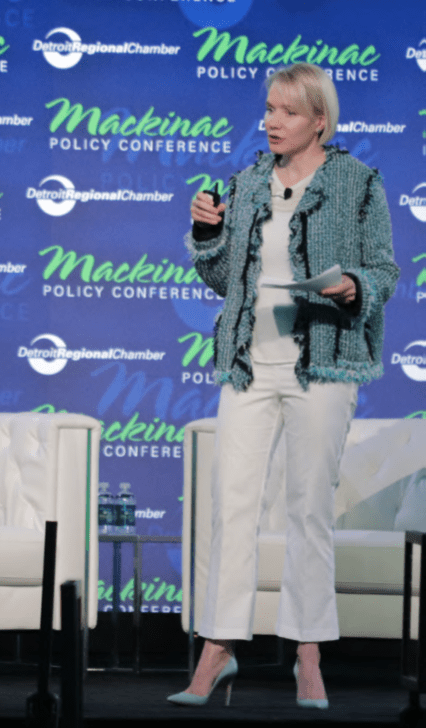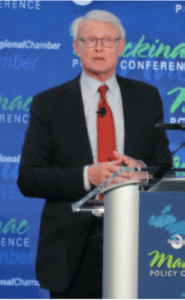Competitive Advantage: Political Strategy Through A Business Lens
December 17, 2019Business leader Katherine Gehl believes every healthy business thrives on competition, as do consumers. But one industry is floundering under a duopoly: the U.S. political system. Gehl is so committed to political reform that she sold her $250 million family business to pursue it.
She hopes to expand the political marketplace instead of forcing its consumers, the electorate, into its current, and increasingly narrow, two-sizes-fit-all party system: Republican or Democrat.
Gehl and economist Michael Porter, a Harvard Business School professor, presented their ideas at the 2019 Mackinac Policy Conference. They’ve since refined them and are writing a book on these strategies that they first fleshed out in a 2017 academic report, Gehl explains.
In “The Politics Industry: How Political Innovation Can Break Partisan Gridlock and Save Our Democracy,” due out in May 2020, Gehl and Porter suggest these changes:
- Open primaries, where voters need not declare a party preference. The top five primary vote-getters would advance in a system Gehl and Porter call the “final five voting “ or “top five.”
- Ranked choice voting in general elections, where voters rank candidates in order of choice. This would encourage more candidates, including those usually elbowed aside by party leaders, who fear they will serve as spoilers and help the opposing party.
Gehl cites Colin Powell as an example. If the former secretary of state decided to run as a Republican candidate against President Donald Trump, the party no longer has the power to keep him out of the race. Powell would come in second in the Republican primary, but might win in a ranked choice general election.
“Our innovation is not necessarily about changing who gets elected, but about changing what they’re rewarded for doing when they are serving. And that’s what top five primaries and ranked choice voting does,” Gehl adds.
Michigan’s Vote Counts

Business leader Katherine Gehl presents her ideas on political reform at the 2019 Mackinac Policy Conference.
Michigan’s voters, particularly its business leaders, are an important part of that change equation.
“These innovations that we propose will be enacted by individual states,” through legislation and referendums, Gehl says. “The audience for these, for this analysis and this prescription, are people in states across the country, and we have a particular focus on business leaders who resonate so well with this description of the challenge we face because they’re used to this competitive lens.”
Gehl expects businesses will be on board because many share the view that Washington is broken and the political machine has halted progress.
“It’s fundamentally what I call free-market politics. And by this, I mean the best of what free markets deliver, which is results, innovation, accountability, healthy competition,” Gehl says.
Competition Cures All
Putting politics under a business microscope is what drew Porter – known for his expertise on strategy, competitiveness, and economic development – into this conversation, he said during his talk at the Mackinac Policy Conference.
“This was the most consequential issue that would really shape the future of our country,” he told the audience.

Harvard Business School Professor Michael Porter supports the proposal with data,
He was aghast to realize that Republicans and Democrats create rules together that protect themselves while discouraging independents from challenging them fairly, what Porter and Gehl dub “barriers to entry.” One instance is in fundraising, he said. The two major parties may receive 313 times the amount an independent may receive in donations, a rule the parties wrote themselves.
By restricting competition, Republicans and Democrats create a culture with no incentive to solve problems, no accountability for results, and no checks and balances, Porter said.
“This is not going to change unless we change it,” he said.
Michigan is ripe for leading the charge, Gehl points out. The Michigan Constitution grants citizens the right to challenge laws they dislike by calling for a voter referendum. Michigan is one of 26 states with such a law.
She and Porter are hoping the state is ready to break the partisan gridlock.
Rene Wisely is a metro Detroit-based freelance writer.
